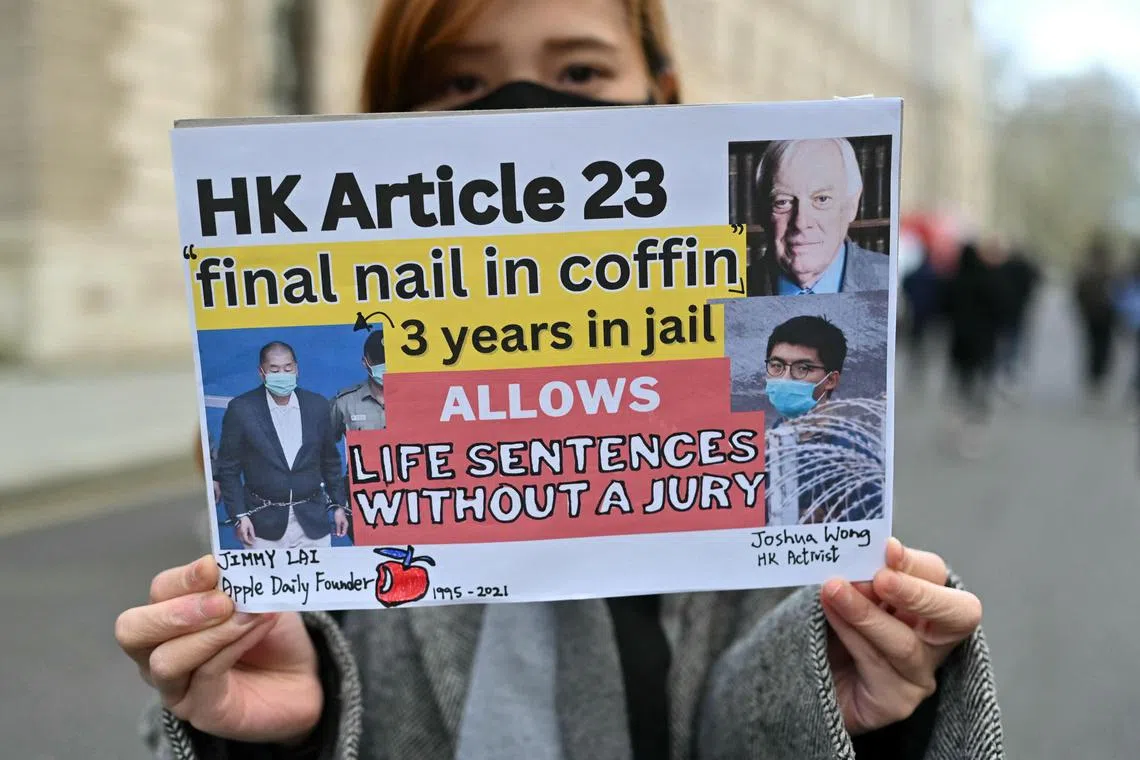Hong Kong makes first arrests under new security law, cites ‘seditious’ online messages
Sign up now: Get insights on Asia's fast-moving developments

The security law, commonly referred to as Article 23, includes penalties of up to life imprisonment for five categories of crime.
PHOTO: AFP
HONG KONG – Hong Kong police arrested six people on May 28 under the city’s new security law for “posting messages with seditious intention” online.
Five women and a man were nabbed for “posting messages with seditious intention on an anonymous social media page since April 2024”, the National Security Department of the Hong Kong Police Force said in a statement.
One of the women arrested was already on remand in a maximum-security women’s prison, the police said.
Security chief Chris Tang confirmed that the woman on remand was Chow Hang-tung, a prominent activist who has been jailed since 2021.
He also said the Facebook page in question was the “Chow Hang-tung Club”.
Chow was the former leader of the now-disbanded Hong Kong Alliance, which had organised an annual candlelight vigil in Hong Kong to mourn the victims of June 4, 1989, when Beijing sent troops into Tiananmen Square to quash appeals for democracy.
The arrests on May 28 come a week before the event’s 35th anniversary, and the police said the online posts were “taking advantage of an upcoming sensitive day”.
The online messages were written “with the aim to incite hatred towards the Central Government (Beijing), the HKSAR Government and the Judiciary, as well as inciting netizens to organise or take part in unlawful activities at a later stage”.
The six people – aged between 37 and 65 – were “suspected of violating section 24 of the Safeguarding National Security Ordinance, which reads ‘Offences in connection with seditious intent’”, the statement said, referring to Hong Kong’s newly enacted law.
It is the first such arrests under the law, commonly referred to as Article 23.
Enacted in March, Article 23 includes penalties of up to life imprisonment for five categories of crime including treason, insurrection, espionage, sabotage and external interference.
It also expanded the British colonial-era offence of “sedition” to include inciting hatred against China’s Communist Party leadership.
It is the city’s second national security law – the first was imposed by Beijing in 2020 after huge, sometimes violent democracy protests were dispelled.
City leader John Lee had said the second law was necessary to plug the legal loopholes of the first, and to “prevent black-clad violence”, a reference to Hong Kong’s protests in 2019, which brought millions to the streets at its height.
The United States, the European Union, Japan and Britain have been among the law’s strongest critics, with UK Foreign Minister David Cameron saying it would “further damage the rights and freedoms” of those in the city. AFP


